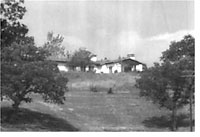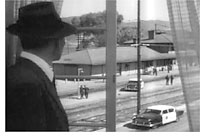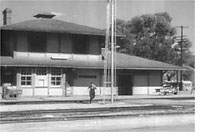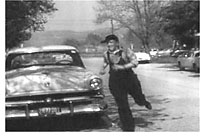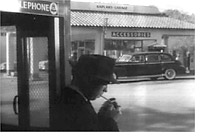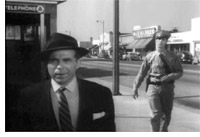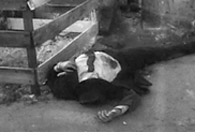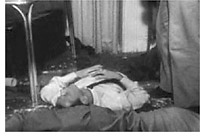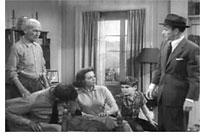 |
||||||||||||||||||||||||||||||||||||||||||||||||||||||||||||||
|
GUESTBOOK: Sign in and share your opinion | CONTRADICTIONS: Hey, that don't make sense! WHY SUDDENLY? Why Suddenly? Fair enough question. My wife keeps asking me why I like such a "dumb movie," so I'll try to answer it. Two things come to mind: The fifties and the Kennedy Assassination. Let me explain. First off, Suddenly looks familiar. In capturing Newhall, California, on film during the spring of 1954, Suddenly recreates my own childhood growing up in Silver Spring, Maryland, just outside Washington, D.C. The buildings, the cars, just the way things look in Suddenly, all seem exactly the way I remember them. I even remember those times in black and white for some reason. We had no American Theater, but I did spend endless Saturday afternoons at the Langley Theater with my two brothers watching cheesy science fiction double features like Queen of Outer Space and Rocketship XM. So in a way, I can readily identify with Pidge and feel totally at home in his town. The second reason Suddenly resonates with me so deeply is the obvious parallels to the Kennedy Assassination. My father worked at the White House in 1963 and I vividly remember hearing about the president being killed from my bus driver as I left school that Friday afternoon. I was ten years old at the time and it is something I'll never forget. Beyond that, Suddenly is simply an enjoyable, well-written, and exciting film to watch. I think Sterling Hayden brings a lot to the character of Tod Shaw, giving him an everyman quality while still retaining the stature of a true screen hero. And while I'm not a Frank Sinatra nut, I think he did great job bringing John Baron to life. Sure, the film presents pacifism as unworkable and reeks of mainstream sexism, but the rest of the cast are all pros, and even the obscure parts are well done and believable. Plus, it's got an old Nash. What more do you want? The film stands up to repeated screenings because it works on so many different levels. Historically, Tod's inability to accept Ellen's point of view must have played well to 1954 audiences, where Korea, Red China and Atomic Spy cases were current fixations. Fueled by the conformity of the Eisenhower years and the McCarthy Investigations (before which actor Hayden, a former Communist Party member, reluctantly named names) the idea of fighting violence with violence was beyond questioning. Baron must have chilled audiences to the bone in his day, but looking back fifty years, his psychotic portrayal mostly consists of leering at the camera, slapping young Pidge across the face, and thinking the unthinkable. This isn't to take anything away from his performance. He's good, as is the rest of the cast. It's just that Baron is truly a product of his time, and times, for better or worse, have changed. Compared to today's creeps, both on screen and off, John Baron doesn't seem all that bad. However, the film's moral premise of right and wrong hasn't aged a bit, regardless of whether you buy into it or not. With the threat of terrorism hitting a raw nerve and Americans overwhelmingly in favor of a violent approach to solving their problems, most would recognize Sheriff Tod Shaw as a relatively modern hero, even if a bit stuck in a sexist rut. Suddenly raises a whole range of interesting propositions: What do you do when violence comes home? Is it moral - or even possible - not to get involved? Is it moral to kill so that others might live? Are some people just "born killers," beyond any means of reason or rehabilitation, and is society partly to blame? And finally, is there a way to oppose violence without compromising your principles? Suddenly takes these complex questions and attempts to answer them with the subtlety of a loaded six-shooter. Compare this approach to a film like Witness (1985), where the question of guns and violence is answered by a community of Amish pacifists. In that film, a rough but basically good cop, John Booker (Harrison Ford), ultimately learns the value of nonviolence and realizes that it takes just as much courage to not pull the trigger as it does to blast away. Of course in Witness the bad guys were greedy and desperate but not psychotic, so when Detective Book asks the gang's surrounded ringleader "Where does it end?," the bad guy drops his gun and gives up, recognizing Book's moral premise. Suddenly's John Baron, on the other hand, would have experienced no such catharsis and would have answered Book and the rest of the Amish farmers with a hail of hot lead; his psychosis having already gone too far. How pacifism must ultimately deal with this situation remains an open question.
CONTRADICTIONS: Hey, that don't make sense! One of the best things about watching a movie is noticing when things don't quite add up. When that happens you're not just a spectator, but an active participant. If a film is really bad, this can be your only incentive to stay till the bitter end, but in Suddenly, these slip-ups just make it that much more enjoyable to watch. See if you recognize these "Hey, that don't make sense!" moments.
Now try and discover your own "Hey, that don't make sense!" moments! |
||||||||||||||||||||||||||||||||||||||||||||||||||||||||||||||
|
|
||||||||||||||||||||||||||||||||||||||||||||||||||||||||||||||

|
||||||||||||||||||||||||||||||||||||||||||||||||||||||||||||||
|
|
||||||||||||||||||||||||||||||||||||||||||||||||||||||||||||||


